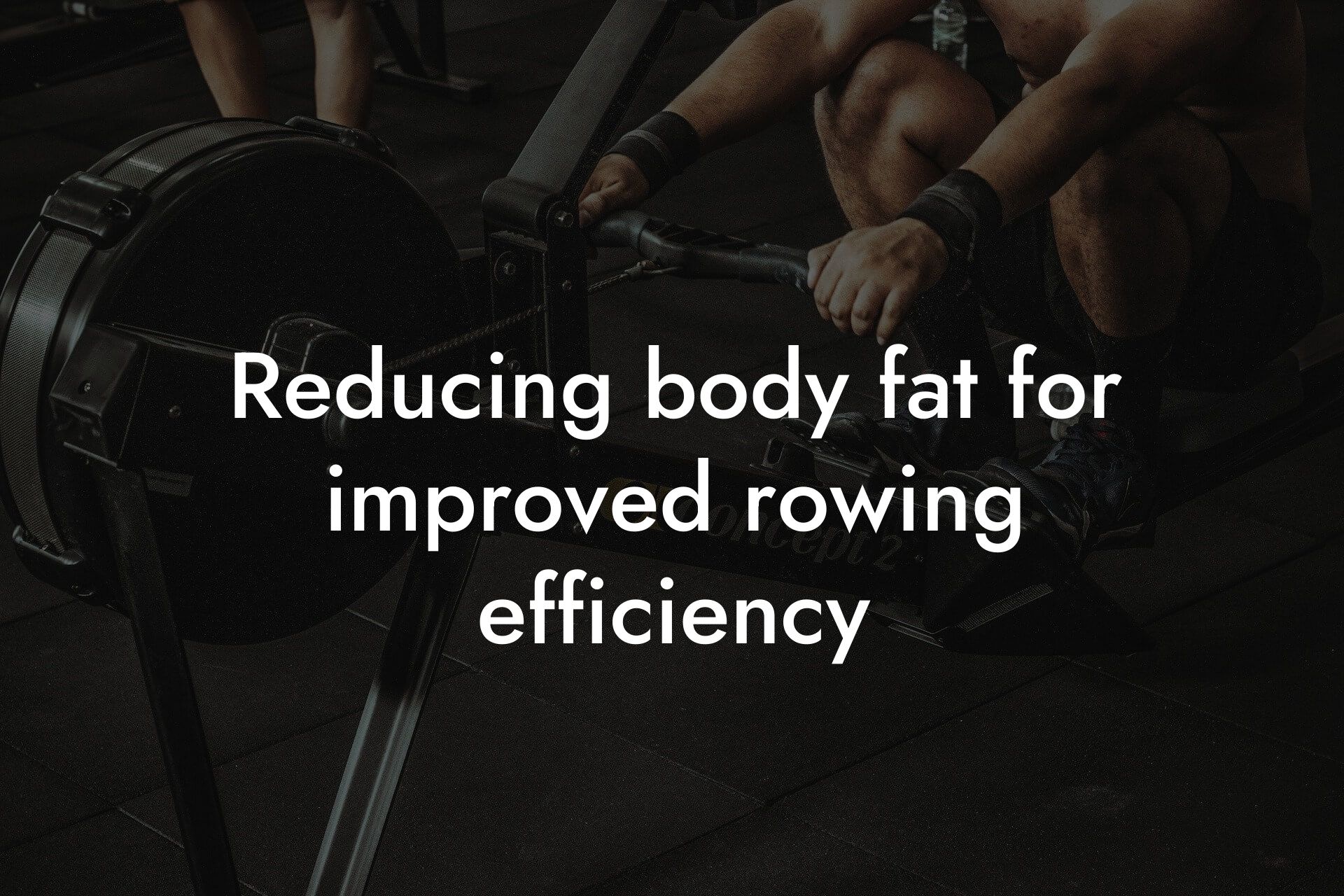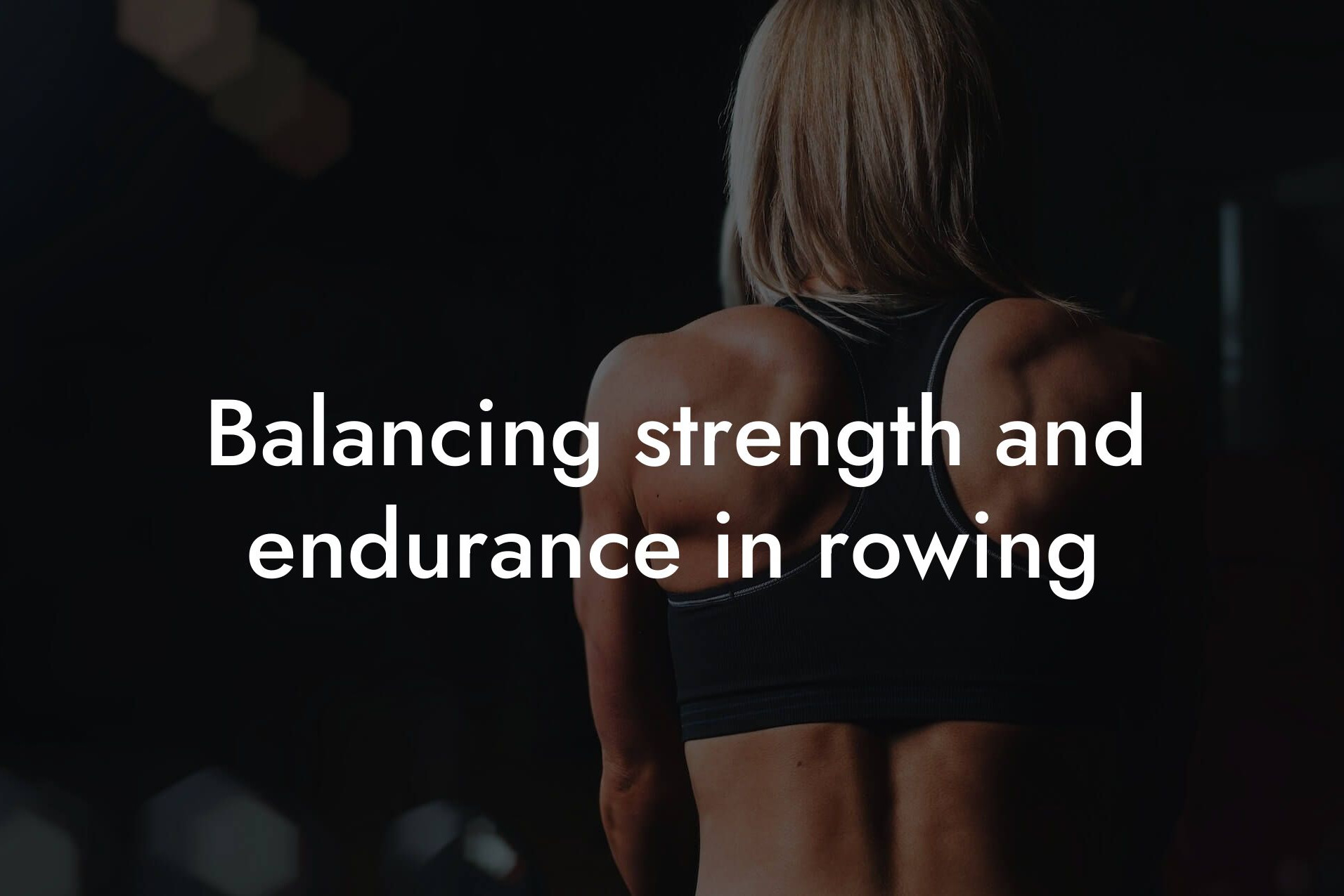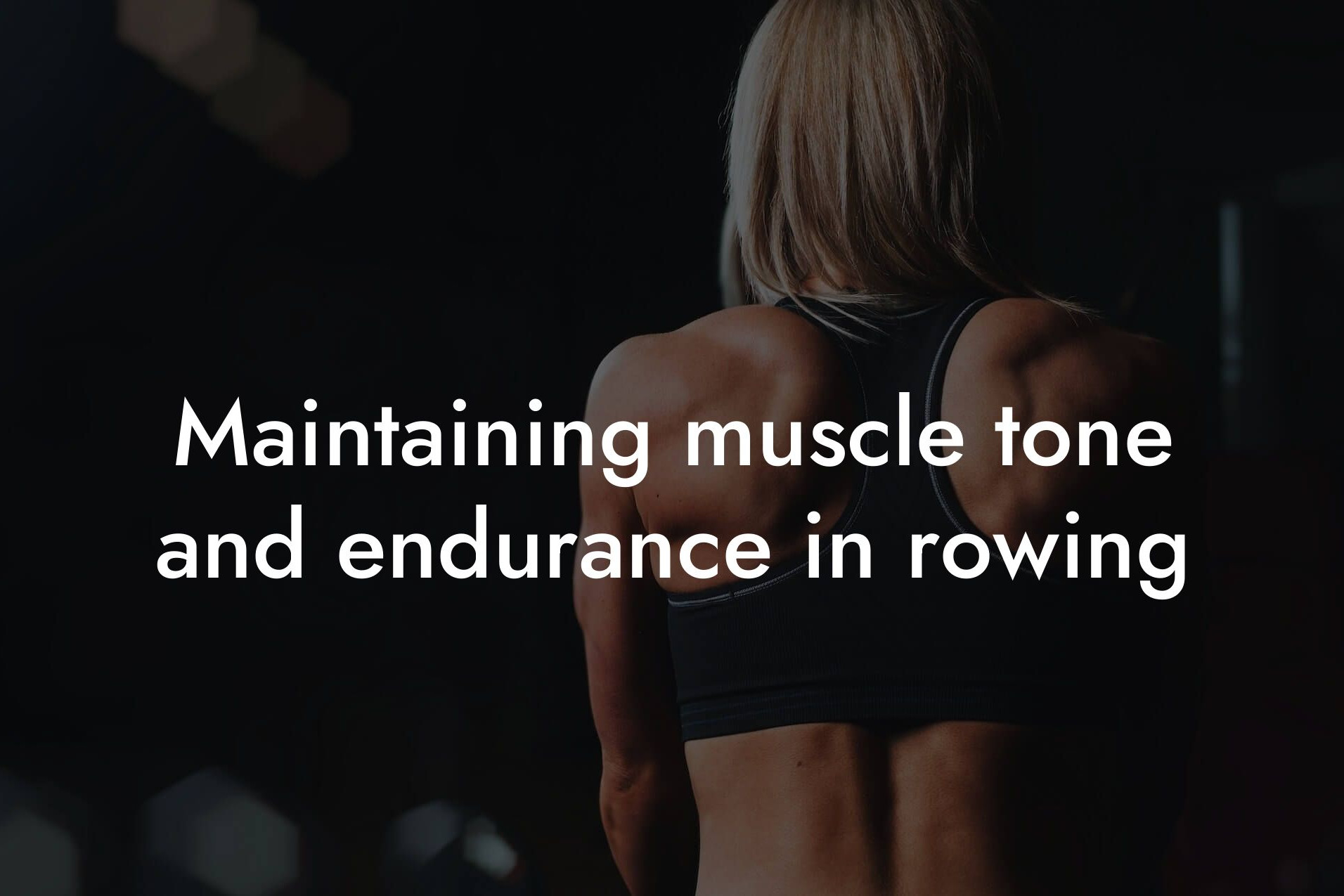As a high-earning professional, you understand the importance of peak physical performance to maintain a competitive edge in your career. Rowing workouts are an excellent way to improve cardiovascular health, build endurance, and enhance overall physique. However, to get the most out of your rowing sessions, it's essential to fuel your body with the right nutrition strategies. In this article, we'll delve into the best nutrition approaches to sustain energy levels during rowing workouts, helping you power through even the most intense sessions.
Table of Contents
- Understanding Energy Production During Rowing
- Carbohydrates: The Primary Energy Source
- Protein: Supporting Muscle Function and Recovery
- Hydration: The Key to Optimal Performance
- Electrolytes: The Forgotten Nutrient
- Timing is Everything: Pre-Workout and Post-Workout Nutrition
- Periodized Nutrition: Adapting to Your Rowing Schedule
- Conclusion: Fueling Your Rowing Performance
- Frequently Asked Questions
Understanding Energy Production During Rowing
Rowing is a high-intensity exercise that demands a significant amount of energy from your body. During a rowing workout, your muscles rely on three primary energy systems: the phosphocreatine (PCr) system, the anaerobic glycolytic system, and the aerobic system. The PCr system provides immediate energy for short, intense bursts, while the anaerobic glycolytic system kicks in for moderate-intensity efforts lasting up to 2-3 minutes. The aerobic system, which relies on oxygen, takes over for longer, lower-intensity exercises.
To optimize energy production during rowing, it's crucial to focus on nutrition strategies that support these energy systems. By doing so, you'll be able to maintain a high intensity throughout your workout, delay fatigue, and recover more efficiently.
Carbohydrates: The Primary Energy Source
Carbohydrates are the primary energy source for high-intensity exercises like rowing. They're broken down into glucose, which is then stored in the muscles and liver as glycogen. During exercise, glycogen is converted into energy, providing the fuel needed to power your rowing strokes. To ensure optimal carbohydrate availability, focus on consuming complex carbohydrates such as whole grains, fruits, and vegetables.
Aim to consume 2-3 grams of carbohydrates per kilogram of body weight 1-3 hours before your rowing workout. For example, if you weigh 70 kg, aim for 140-210 grams of carbohydrates. Some excellent pre-workout carbohydrate sources include:
- Bananas (30-40 grams of carbohydrates per medium-sized fruit)
- Oatmeal with fruit and nuts (50-60 grams of carbohydrates per serving)
- Whole-grain bread with avocado and eggs (40-50 grams of carbohydrates per serving)
Protein: Supporting Muscle Function and Recovery
While carbohydrates provide energy, protein plays a critical role in supporting muscle function and recovery during rowing workouts. Aim to consume 15-20 grams of protein 1-2 hours before your workout, and 20-30 grams within 30-60 minutes after your workout. This will help promote muscle protein synthesis, reduce muscle damage, and support recovery.
Some excellent protein sources include:
- Lean meats like chicken, turkey, or fish
- Eggs
- Legumes like lentils, chickpeas, or black beans
- Whey protein or casein protein supplements
Hydration: The Key to Optimal Performance
Adequate hydration is essential for optimal performance during rowing workouts. Water makes up approximately 60% of your body weight, and even mild dehydration can lead to decreased performance, fatigue, and increased risk of injury. Aim to drink at least 8-10 glasses of water per day, and make sure to drink 1-2 glasses of water 15-30 minutes before your workout.
In addition to water, consider incorporating electrolyte-rich beverages like coconut water or sports drinks to replenish lost electrolytes during intense exercise. Electrolytes like sodium, potassium, and magnesium play a crucial role in regulating muscle and nerve function, and deficiencies can lead to muscle cramps, weakness, and fatigue.
Electrolytes: The Forgotten Nutrient
Electrolytes are essential for maintaining proper muscle and nerve function during exercise. Sodium, potassium, magnesium, and calcium are the four primary electrolytes lost in sweat, and deficiencies can lead to decreased performance, muscle cramps, and fatigue. To replenish electrolytes, consider incorporating electrolyte-rich foods and beverages into your diet, such as:
- Bananas (rich in potassium)
- Avocados (rich in potassium)
- Nuts and seeds (rich in magnesium)
- Coconut water or sports drinks (rich in sodium, potassium, and magnesium)
Timing is Everything: Pre-Workout and Post-Workout Nutrition
The timing of your nutrition is critical for optimal performance during rowing workouts. Aim to consume your pre-workout meal 1-3 hours before your workout, and your post-workout meal within 30-60 minutes after your workout. This allows for optimal digestion, absorption, and utilization of nutrients.
For your pre-workout meal, focus on complex carbohydrates, moderate amounts of protein, and healthy fats. Some examples include:
- Oatmeal with banana, almond butter, and eggs
- Whole-grain toast with avocado, turkey, and cheese
- Greek yogurt with berries, honey, and walnuts
For your post-workout meal, focus on carbohydrates and protein to promote recovery and muscle protein synthesis. Some examples include:
- Chocolate milk with protein powder and banana
- Greek yogurt with berries and honey
- Turkey and avocado wrap with whole-grain tortilla
Periodized Nutrition: Adapting to Your Rowing Schedule
As you progress through your rowing training, your nutrition needs will adapt to your changing energy demands. Periodized nutrition involves adjusting your macronutrient ratios, meal timing, and food choices to match your training phase. For example:
- During high-intensity training phases, increase your carbohydrate intake to support energy production.
- During low-intensity training phases, focus on protein and healthy fats to support recovery and muscle growth.
- During taper phases, reduce your overall caloric intake to allow for recovery and adaptation.
Conclusion: Fueling Your Rowing Performance
In conclusion, optimizing nutrition for sustained energy during rowing workouts requires a comprehensive approach that incorporates carbohydrates, protein, hydration, electrolytes, and periodized nutrition. By fueling your body with the right nutrients at the right time, you'll be able to power through even the most intense rowing sessions, recover more efficiently, and achieve your fitness goals. Remember to stay flexible, adapt to your changing energy demands, and consult with a sports dietitian or healthcare professional for personalized nutrition guidance.
At Tano Performance Group, we understand the importance of optimal nutrition for peak physical performance. Our comprehensive body assessment using DEXA technology provides valuable insights into your body composition, bone density, and physique, helping you make informed decisions about your nutrition and training. Take your fitness to the next level with our expert guidance and support.
Frequently Asked Questions
What is the importance of nutrition for sustained energy during rowing workouts?
Nutrition plays a critical role in maintaining energy levels during rowing workouts. A well-planned diet provides the necessary fuel for your body to perform at its best, delay fatigue, and support recovery. Adequate nutrition helps to optimize your rowing performance, reduce the risk of injury, and enhance overall physical and mental well-being.
What are the key nutrients required for sustained energy during rowing?
The three primary macronutrients – carbohydrates, protein, and fat – are essential for sustained energy during rowing. Carbohydrates provide energy for high-intensity exercise, protein supports muscle function and repair, and fat serves as a secondary energy source. Additionally, adequate hydration and electrolyte balance are crucial for optimal performance.
How many calories do I need to consume for a rowing workout?
The caloric needs for a rowing workout vary depending on factors such as your weight, intensity, and duration of the workout. A general guideline is to consume 150-300 calories per hour of exercise, with a mix of carbohydrates and protein. However, it's essential to experiment and find the right balance that works best for you.
What is the best source of carbohydrates for rowing energy?
Complex carbohydrates such as whole grains, fruits, and vegetables are ideal for rowing energy. They provide sustained energy release, are rich in fiber, and help maintain blood sugar levels. Examples of complex carbohydrates include brown rice, whole wheat bread, and sweet potatoes.
How much protein do I need for rowing recovery?
Aim to consume 15-30 grams of protein within 30-60 minutes after your rowing workout to support muscle recovery and repair. You can achieve this through a combination of protein-rich foods and supplements, such as whey protein or casein protein.
What is the role of hydration in rowing performance?
Adequate hydration is critical for rowing performance, as even mild dehydration can lead to decreased power output and endurance. Aim to drink at least 17-20 ounces of water 2-3 hours before exercise, and continue to hydrate during and after your workout.
What are electrolytes, and why are they important for rowing?
Electrolytes are essential minerals that regulate various bodily functions, including muscle contractions and nerve impulses. During rowing, electrolytes such as sodium, potassium, and magnesium are lost through sweat, leading to muscle cramps, fatigue, and decreased performance. Replenish electrolytes through sports drinks, fruits, and nuts.
Can I use sports drinks during rowing workouts?
Sports drinks can be beneficial during high-intensity, long-duration rowing workouts, especially in hot and humid environments. They help replenish electrolytes, carbohydrates, and fluids, reducing the risk of dehydration and electrolyte imbalance. However, for low-to-moderate intensity workouts, water and electrolyte-rich foods may be sufficient.
How can I prevent bonking during rowing?
Bonking, or hitting the wall, occurs when your body's energy stores are depleted. To prevent bonking, ensure you're consuming adequate carbohydrates and electrolytes before, during, and after your workout. Additionally, pace yourself, and adjust your intensity and duration based on your body's response.
What are the best snacks for rowing energy?
Opt for snacks that are high in carbohydrates, moderate in protein, and low in fat and fiber. Examples of ideal snacks include energy bars, bananas, dates, and sports drinks. Aim to consume snacks 30-60 minutes before your workout, and every 30-60 minutes during prolonged exercise.
Can I eat a meal before rowing, or should I stick to snacks?
A meal 1-3 hours before rowing can provide sustained energy, but choose a balanced meal that's easy to digest, such as oatmeal with fruit and nuts, or a turkey sandwich on whole grain bread. Avoid heavy, greasy, or high-fiber foods that can cause digestive discomfort during exercise.
What are the benefits of caffeine for rowing performance?
Caffeine can improve rowing performance by increasing alertness, focus, and muscle contraction force. However, be cautious of excessive caffeine intake, as it can lead to dehydration, jitters, and decreased performance. Aim for a moderate dose of 100-200mg, about 30 minutes before exercise.
How does nutrition impact rowing recovery?
Nutrition plays a critical role in rowing recovery, as it helps replenish energy stores, repair muscle damage, and reduce inflammation. Focus on consuming carbohydrates and protein within 30-60 minutes after exercise, and continue to hydrate and replenish electrolytes throughout the recovery period.
What are the best post-rowing recovery foods?
Opt for foods that are high in carbohydrates, moderate in protein, and low in fat and fiber. Examples of ideal recovery foods include chocolate milk, Greek yogurt with berries, and turkey or chicken sandwiches on whole grain bread. Aim to consume these foods within 30-60 minutes after exercise.
Can I use protein shakes or supplements for rowing recovery?
Protein shakes or supplements can be a convenient and effective way to support rowing recovery, especially when consumed within 30-60 minutes after exercise. Look for products that contain 15-30 grams of protein, and consider adding carbohydrates and electrolytes for enhanced recovery.
How can I monitor my body's response to nutrition and rowing?
Pay attention to your body's signs and symptoms, such as energy levels, digestion, and muscle soreness. Keep a training and nutrition log to track your progress, and adjust your nutrition strategy based on your body's response.
What are the common nutrition mistakes rowers make?
Common nutrition mistakes include inadequate carbohydrate intake, poor hydration, and insufficient electrolyte replenishment. Additionally, rowers may not consume enough protein for recovery, or may rely too heavily on supplements rather than whole foods.
How can I work with a sports dietitian or nutritionist for personalized guidance?
Consider consulting a sports dietitian or nutritionist who specializes in rowing or endurance sports. They can provide personalized guidance on nutrition planning, meal preparation, and supplementation, helping you optimize your performance and achieve your goals.
What are the benefits of periodized nutrition for rowing?
Periodized nutrition involves tailoring your nutrition plan to specific training phases, such as high-intensity training or recovery. This approach can help optimize your body's adaptation to training, improve performance, and reduce the risk of overreaching and injury.
How can I incorporate nutrition strategies into my rowing training plan?
Work with your coach or trainer to develop a comprehensive training plan that incorporates nutrition strategies, such as carbohydrate loading, protein timing, and hydration protocols. This will help you optimize your performance and achieve your rowing goals.
What are the key takeaways for nutrition strategies for sustained energy during rowing workouts?
The key takeaways include consuming a balanced diet that includes carbohydrates, protein, and fat, staying hydrated, replenishing electrolytes, and fueling before, during, and after exercise. Additionally, pay attention to your body's response, monitor your progress, and adjust your nutrition strategy accordingly.
Here are some related articles you might love...
- Reducing body fat for improved rowing efficiency
- Balancing strength and endurance in rowing
- Maintaining muscle tone and endurance in rowing
- Recovery techniques for rowers after intense sessions
- How body composition impacts rowing performance
- The role of rowing in cardiovascular health
- Strength training tips to complement your rowing routine
- Using DEXA scans to monitor progress in rowing
- Bone density and its role in rowing performance
Zak Faulkner
Zak Faulkner is a leading authority in the realm of physical health and body composition analysis, with over 15 years of experience helping professionals optimise their fitness and well-being. As one the experts behind Tano Performance Group, Zak has dedicated his career to providing in-depth, science-backed insights that empower clients to elevate their physical performance and overall health.
With extensive knowledge of DEXA technology, Zak specializes in delivering comprehensive body assessments that offer precise data on body fat, muscle mass, bone density, and overall physique. His expertise enables individuals to make informed decisions and achieve their fitness goals with accuracy and confidence. Zak’s approach is rooted in a deep understanding of human physiology, combined with a passion for helping clients unlock their full potential through personalised strategies.
Over the years, Zak has earned a reputation for his commitment to excellence, precision, and client-focused service. His guidance is trusted by top professionals who demand the best when it comes to their health. Whether advising on fitness programs, nutritional strategies, or long-term wellness plans, Zak Faulkner’s insights are a valuable resource for anyone serious about taking their health and fitness to the next level.
At Tano Performance Group, Zak continues to lead our Content Team revolutionising how professionals approach their physical health, offering unparalleled expertise that drives real results.




